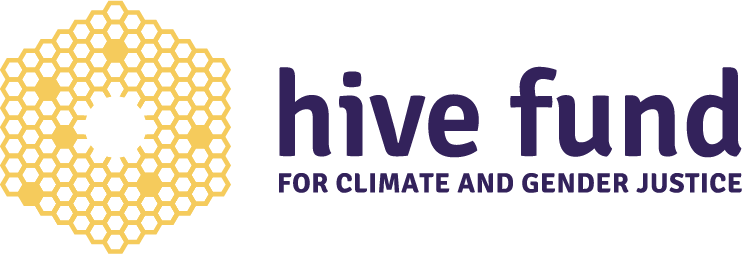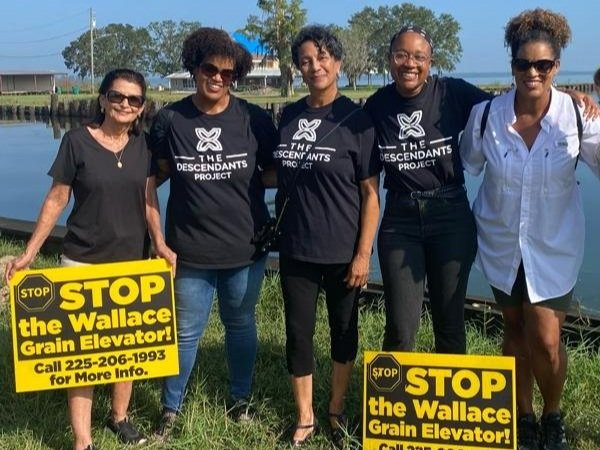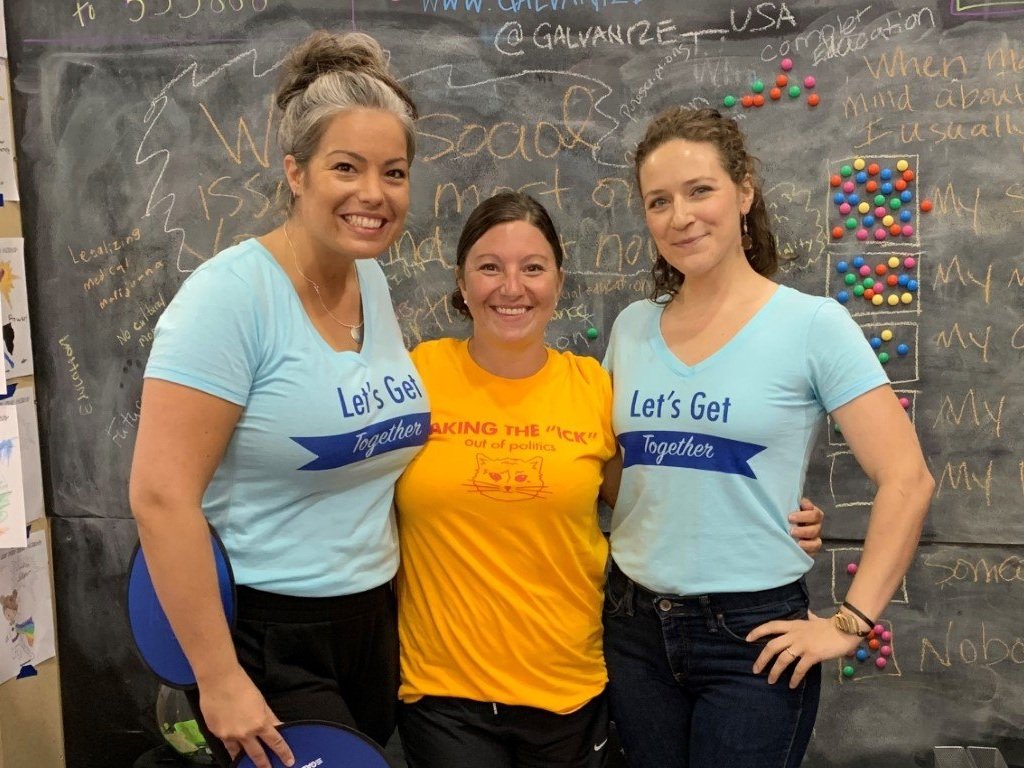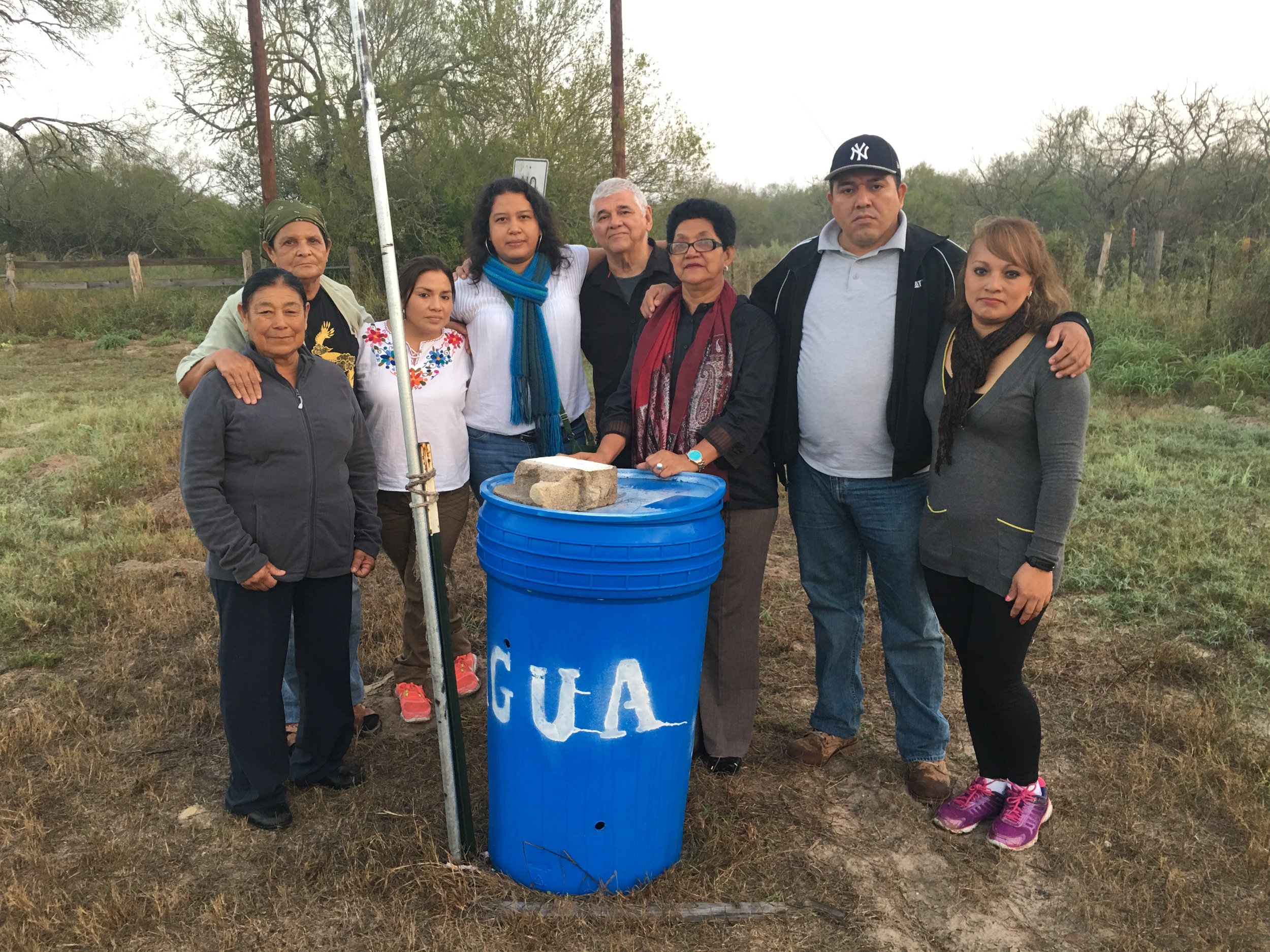Gulf South Grantmaking
Nearly 200 highly-polluting new oil, gas, and petrochemical pipelines, refineries, processing plants, and export facilities have been proposed, predominately in Black, Brown, and Indigenous communities along the Texas and Louisiana coasts - mainly to increase export infrastructure for oil and gas to be shipped and burned around the world. If built, emissions from these facilities would be locked in for decades and would make Texas and Louisiana together the world’s seventh largest polluter in the world, right behind China, India, the United States, and Russia.
Communities across the region are implementing successful campaigns to prevent these new sources of pollution, while working toward a transition to a cleaner and more equitable economy. Together, these efforts are improving the health, safety, and resiliency of communities of color locally while also having momentous ripple effects globally.
Louisiana
Louisiana is an epicenter for extreme climate impacts like sea level rise, hurricanes, and climate migration, as well as planet-warming pollution from oil and gas industry emissions. It’s also an epicenter for some of the most promising and innovative solutions at the intersection of climate, gender, and racial justice. Grantee partners are working to slow and stop planned expansion of key oil, gas, and petrochemical plants build and wield civic power through year-round civic engagement, policy advocacy, and communications.
Alliance for Affordable Energy is the designated fiscal hub for Louisiana’s Gulf South for a Green New Deal formation of more than 80 organizations. Participating groups are working to develop a People’s Climate Plan, expanding on the work of the Governor’s Climate Task Force, and connecting communities around the state with a shared vision for a just transition away from the state’s historic extractive economies.
The Deep South Center for Environmental Justice is dedicated to improving the lives of children and families harmed by pollution and vulnerable to climate change in the Gulf Coast Region through research, education, community and student engagement for policy change, as well as health and safety worker training for environmental careers.
Electoral Collective is building a climate constituency in Louisiana by organizing and leveraging the collective power of existing climate justice and civic engagement groups across the state. The Collective provides a collaborative structure and critical resources including messaging guidance, coordination, and technical support for organizations to run aligned and successful campaigns to educate and mobilize voters.
Finance New Orleans (FNO) is a community-based lending institution with a nonprofit arm that leverages public resources with private and philanthropic capital to create lasting impact, including green building certifications, green job creation, substantiable and affordable housing, clean energy production, stormwater mitigation, and more. FNO operates in three core programs areas: single family, multifamily, and infrastructure.
Foundation for Louisiana is a social justice philanthropic intermediary working to address the longstanding inequities that have shaped life outcomes for Louisianans. Their Climate Justice Program implements pathways for holistic action towards a just and vibrant future by building people power, advancing just climate policy, and cultivating new narratives.
Founded in 1995, Healthy Gulf’s mission is to collaborate with and serve communities who love the Gulf of Mexico by providing research, communications and coalition-building tools. Healthy Gulf supports communities facing the greatest threats of environmental injustice as they advocate for clean air and water, coastal restoration, sustainable fisheries and a just transition.
Housing NOLA’s Own the Crescent platform aligns policy advocacy, community engagement, and investment to create affordable, resilient, and green housing for underserved communities in New Orleans’ urban core. The platform works with local community development finance institutions and philanthropy to pull together blended capital stacks that address a range of persistent barriers to financing energy efficiency and solar.
Institute for Market Transformation (IMT) co-creates public policy for high-performing and low carbon buildings. They work with community, business and government leaders to make it easier for people to take action and to increase access to affordable, clean, and reliable energy. IMT provides advisory support staff to Commissioner Davante Lewis of the Public Service Commission of Louisiana.
Louisiana Against False Solutions (LAFS) is a coalition of more than twenty groups fighting the buildout of carbon capture and storage infrastructure and working to strengthen weak regulations governing it. LAFS leverages expertise from law, environmental science, traditional and Indigenous knowledge-holders, experienced campaigners, fisherfolk, and frontline communities to create a powerful, aligned, and strategic campaign against the polluting industry’s false solutions.
Power Coalition for Equity and Justice is a statewide civic engagement and base building table in Louisiana that is working to shift power back to the people, fight policies that hurt the state’s families, and increase voter participation by building support structures for community activism.
Photo by L. Kamisu Harris
RISE St. James is a faith-based organization focused on protection of the people and environment of St. James Parish. Their goal is to make St. James Parish inhospitable to the petrochemical expansion that threatens to exacerbate climate impacts already harming the region.
Taproot Earth is a non-profit justice center with a mission to advance structural shifts toward climate justice and ecological equity in communities of color on the frontline of climate change. Taproot Earth is the regional anchor organization for the Gulf South for a Green New Deal initiative and national anchor for the Red, Black & Green New Deal initiative with the Movement for Black Lives.
The Descendants Project was founded to preserve and protect the health, land, and lives of the Black descendant community located in Louisiana’s River Parishes. Through advocacy, resources, engaging the descendant community, and creating strategies for a safe and sustainable economy, The Descendants Project utilizes an innovative approach that uplifts cultural and emotional enrichment for the community’s ultimate liberation.
VAYLA New Orleans exists as an embodiment and commitment to activating tomorrow’s Asian American and Pacific Islander leaders. In order to fulfill that mission, VAYLA works with young people to address the issues facing our community using an intersectional AAPI lens. These issues include environmental and climate justice, reproductive justice, and civic engagement.
The Vessel Project of Louisiana organizes in Southwest Louisiana to achieve environmental and climate justice; voting rights; and access to housing, affordable energy, clean water, safe fresh produce, and healthcare. They plan to step up organizing against several newly proposed LNG export facilities in the region.
Texas
Texas produces more than double the global warming pollution of any other state in the US, warming the climate and causing serious, acute, and chronic health problems that disproportionately impact communities of color and low-income communities. The Hive Fund is supporting organizations led by women, people of color, and others on the frontlines in Texas that are working to prevent, reduce, and eliminate this pollution in ways that simultaneously improve health, reduce racial injustice and wealth inequality, and build a stronger, more reflective democracy. Our new grantmaking in Houston is also supporting a constellation of groups in Houston to access the billions of dollars needed to fund a just transition to clean energy in the city.
ACTS (Achieving Community Tasks Successfully) is a community-based nonprofit organization that seeks to leverage citizen science, training and community engagement to address both environmental and social justice.
Air Alliance Houston (AAH) believes everyone has a right to breathe clean air and where you live should not determine your health. Through applied research, education, and advocacy, AAH works in partnership with impacted communities to effect policy change for a more equitable and sustainable future for the Houston region.
Using science, law, and education, Bayou City Waterkeeper (BCWK) advocates for flood protections, holds water polluters and those in power accountable, and develops tools for communities and leaders to advocate for water justice. BCWK plays a role as a strategic liaison between community partners on the ground and with local/regional level decision-makers and policymakers, with a focus on systemic change in water policy that centers climate resilience and environmental justice.
BRIDGE Infrastructure Fund (Building Resourced Infrastructure for Diverse Grassroots Engagement) is a state-based civic engagement innovation hub building the next generation of progressive leadership and organizations in Texas. Empowering BIPOC, LGBTQIA+, and youth leaders, BRIDGE is holistically supporting movement building in Texas from the ground up.
The Robert D. Bullard Center for Environmental and Climate Justice at Texas Southern University works to address environmental, climate, economic, energy, transportation, food and water and health justice, while working to eliminate structural inequality and systemic racism. The Center’s primary mission is focused on education and training, public policy analysis and research to action.
The Carrizo/Comecrudo Tribe preserves, maintains, protects, and offers services that will better tribal communities’ ability to overcome the erasure of the Original People of Texas. The tribe partners with regional organizations working to stop proposed new oil and gas facilities in South Texas, and works to regain control of tribal lands near the proposed border wall.
Based in Corpus Christi, Chispa Texas works to invigorate the environmental movement with new Latinx leaders, increase voter participation, and hold elected officials accountable, all in order to improve the quality of life of communities.
The Clean Energy Fund of Texas aims to reduce greenhouse gases and address equity by financing energy and water conservation projects, facilitating the deployment of more renewable energy, and investing in other decarbonization strategies.
The Coalition for Environment, Equity and Resilience is a collaborative of 27 organizations working at the intersection of climate change, health, and equity, through values-based organizing and community-driven policy campaigns to achieve a more equitable, healthy and climate-resilient Houston region.
Photo by Kelly West
Commission Shift is reforming oil and gas oversight in Texas, a global influence on the oil and gas industry. The organization works to build public support to hold the Railroad Commission of Texas accountable to its mission in a shifting energy landscape.
Photo copyright One Breath Partnership Houston
Connective is a Houston-based nonprofit that transforms social services into a more connected, empathic, and accessible system. Using human-centered design, civic technology, and collective action Connective connect households with year-round and post-disaster services. Connective coordinates the delivery of home repair and financial assistance, seeks to streamline and remove barriers to weatherization, leads the co-creation of a local disaster recovery framework, and conducts human-centered design research to inform the region's social resilience and climate adaptation.
Photo by Vanessa Ramos
Deceleration is a nonprofit online journal producing original news and analysis going to the roots of climate disturbance in historical systems of oppression while expanding and deepening solutions for protecting and creating the commons.
East Harris County Empowerment Council exists to improve the quality of life through innovative, sustainable programs and services that empower men, women, and youth to achieve their full potential.
For the Greater Good, based in Corpus Christi, builds community and advocates for better quality of life. The organization’s work includes fighting desalination and industrial buildout, driving awareness campaigns, and creating the community they want to see.
Galvanize USA is helping strengthen our democracy and build the durable, multi-racial majority needed to advance progress across many issues, focusing on the 26 million moderate White and Latina women who want a country that works better for everyone, but who are not yet reliably using their civic power to help achieve that. Galvanize employs a one-of-a-kind, research-driven approach help them stand up for their values and become agents of change. Galvanize has previously worked mainly in the Midwest, but in 2023 is expanding into Texas.
Photo by Jon Shapley
The Houston Climate Justice Museum & Cultural Center is a museum located in Houston’s East End whose mission is to use climate change as a jumping off point for rethinking what museums do. It focuses on interdisciplinary engagement with environmental injustice and the climate crisis. The museum aims to draw attention to the unequal effects of climate change and the experience of frontline communities.
The work of Houston in Action (HIA) is rooted in the belief that an organized and empowered community can bring about transformative change. HIA works for more powerful communities by supporting Black-led, Latinx-led, and AAPI organizing culture; re-imagining Democracy by and for BIPOC, women, low-income, LGBTQ and youth; and supporting new non-profit organizations.
Indigenous Peoples of the Coastal Bend is an intertribal community group in Corpus Christi Texas whose mission is to preserve, conserve, and cultivate their culture in the Coastal Bend area, where all their ancestors once lived together. The organization is playing a key role in halting the expansion of the largest oil export terminal in the United States and stopping desalination plants proposed to support industrial expansion in the region.
Jolt Initiative employs a multi-pronged approach that builds long-term power for young people of color in Texas, giving them the ability to drive a progressive youth justice agenda, shape the state conversation on climate change, and consolidate their power through statewide civic engagement efforts.
LINK Houston believes that transportation – how we get to where we need to go – should not be a barrier to accessing opportunities. For communities of color across Houston, a lack of equitable investments continues to perpetuate historic disadvantages, including environmental and climate impacts. LINK Houston is working to change that system by shaping transportation-related policies through data analysis and community engagement.
All of Mi Familia Vota Education Fund’s work is centered around racial justice and equity. Its mission is to unite the Latino community and its allies to promote social, environmental and economic justice through increased civic participation.
Photo by Winston O’Neal
MOVE (Mobilize, Organize, Vote, Empower) Texas Civic Fund is a grassroots, nonpartisan, nonprofit organization building power in underrepresented youth communities through civic engagement, leadership development, and issue advocacy. MOVE is committed to building a Texas that believes in young people and invests in their leadership.
Northeast Houston Redevelopment Council is committed to elevating equitable opportunities in the Northeast Houston community. The council works to help the community realize equity in this historically underserved community by working with the seven schools in the Kashmere Feeder Pattern, helping to alleviate food insecurity, and improve health resources.
The Organizers Institute South and West Industrial Areas Foundation (IAF) strengthens community-based organizing and supports organizers in the South & Western US. Texas IAF affiliates are working with allies in the environmental, education, and labor movements to shape tax policy in a way that bolsters the state budget and maintains good jobs.
Radical Registrars is a grassroots, Black woman led organization born out of the George Floyd/BLM protests of 2020. Radical Registrars seek to empower and educate the communities laws are made for, their eligibility to vote and how issues they care about are directly affected by elections.
Solar United Neighbors (SUN) is dedicated to building a clean, equitable energy system with rooftop solar as the cornerstone. SUN facilitates a prosperous and just energy transition by providing free public education about solar energy, organically growing market demand for rooftop solar, and supporting local solar jobs and businesses. SUN works closely with community partners to ensure that the economic and social benefits of renewable energy development are invested into the local communities it serves.
The South Texas Human Rights Center (STHRC) responds to the humanitarian crises of migration and migrant death across South Texas and the border region. Since 1995, climate change and free trade agreements have become dual drivers of migration crises. STHRC participates in local organizing to end oil and gas industrial expansion and fossil fuel extraction across the South Texas region, with a focus on building political power and campaigning alongside groups working for climate justice.
Texas Climate Jobs Project is advancing a pro-worker, pro-climate agenda in Texas that helps build the Texas labor movement, reduce carbon emissions, and address racial, income, and climate injustice. To fulfill its mission, Texas Climate Jobs Project builds coalitions, produces quality research, supports strategic organizing, and educates the public on the intersection of clean energy and good jobs.
Texas For All is the largest progressive coalition based in Texas. Its member groups are strategically aligned and committed to the long-term goal of creating a Texas that truly works for all communities. Texas For All defends democracy, advances racial and climate justice, protects workers’ rights, and makes abortion and all healthcare accessible.
Texas Freedom Network Education Fund's Texas Rising program is a movement of young, diverse Texans working to leverage power through leadership development, issue advocacy, community organizing and civic engagement.
The Barbara Jordan Leadership Institute (BLJI) is a Black-women founded and led civic community-based organization in Dallas/Fort Worth, East Texas, and Greater Houston. Its work focuses on providing a comprehensive approach to community-based leadership in action through voter education, advocacy, and leadership development. BJLI strengthens the current generation of Black women leaders while recruiting and preparing the next generation.
The Campaign to Block New Markets for Oil & Gas, fiscally sponsored by the Sierra Club Foundation and led by Sierra Club's Rebekah Hinojosa, centers coalition-building and community organizing to challenge proposed oil and gas infrastructure along the Gulf Coast. The Carrizo/Comecrudo Tribe is a key partner, with aligned funding from Equation Campaign.
Trucha is an independent multimedia organization dedicated to the people, the culture, and social movements of the Rio Grande Valley, the southernmost tip of the US-Mexico border. Trucha creates and curates community journalism, videography, and creative programming to craft holistic regional narrative that counters the region’s harmful mainstream framing.
Photo by Dina Nunez
Vecinos para el Bienestar de la Comunidad Costera (a committee project of Border Workers United) trains the Spanish-speaking immigrant community near Brownsville to conduct community outreach and education on the health and environmental impacts of the LNG buildout in the region. They were involved, alongside other grantee partners in the area, in litigation against the Federal Energy Regulatory Commission and the Environmental Protection Agency.
West Street Recovery works to help families recover from disasters, and uses that process to build a world that is more just and equitable. The organization pushes governments to spend money in ways that move towards racial reparations, and carries out its own work so that it models gender equality, intergenerational and interracial solidarity, cross class knowledge building, creativity, and ambitious vision.
Additional Gulf South Grantee Partners
One Voice is a fifteen-year-old social justice organization working to create thriving communities by building progressive leadership in Mississippi. The organization accomplishes this through training and community organizing that puts the voices of traditionally marginalized communities first.



















































